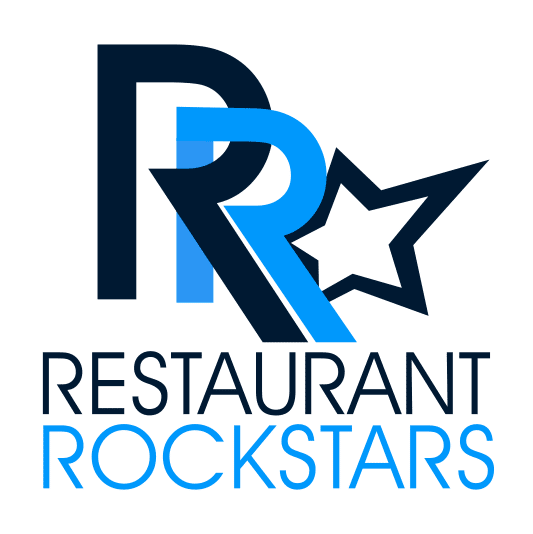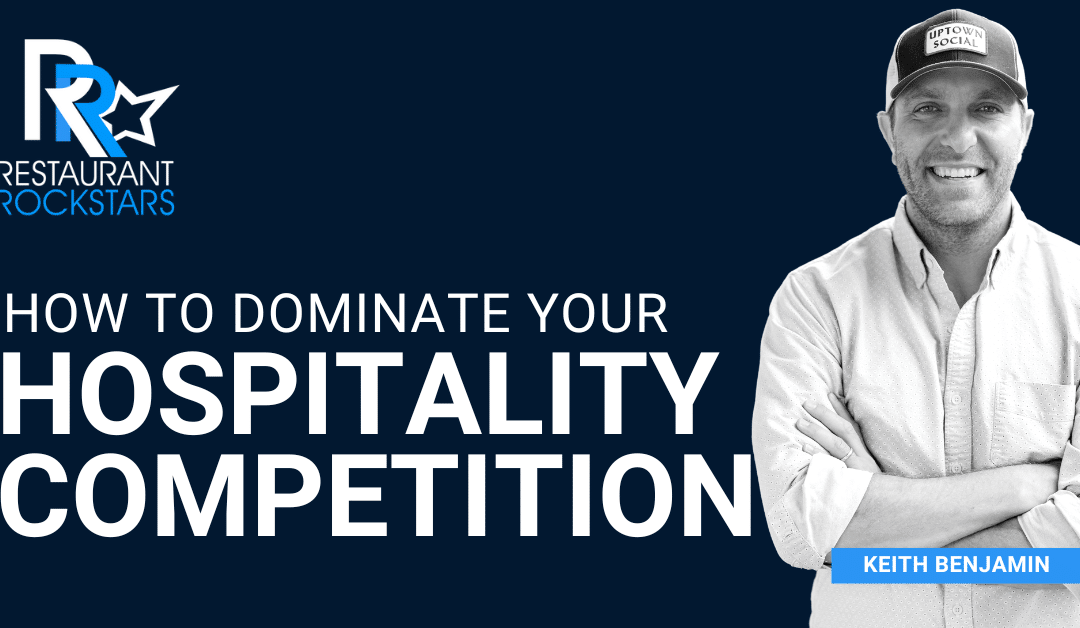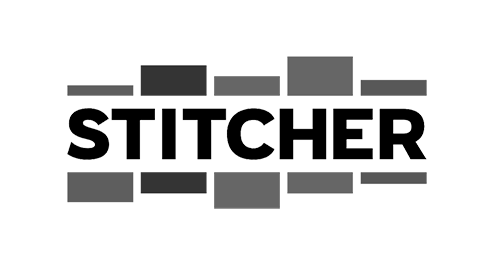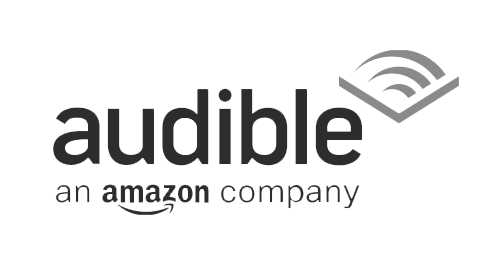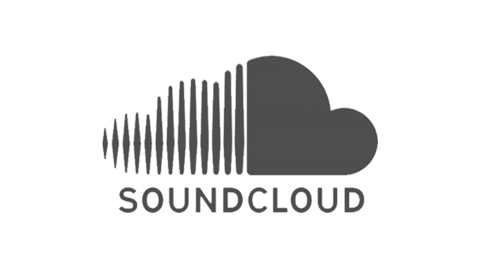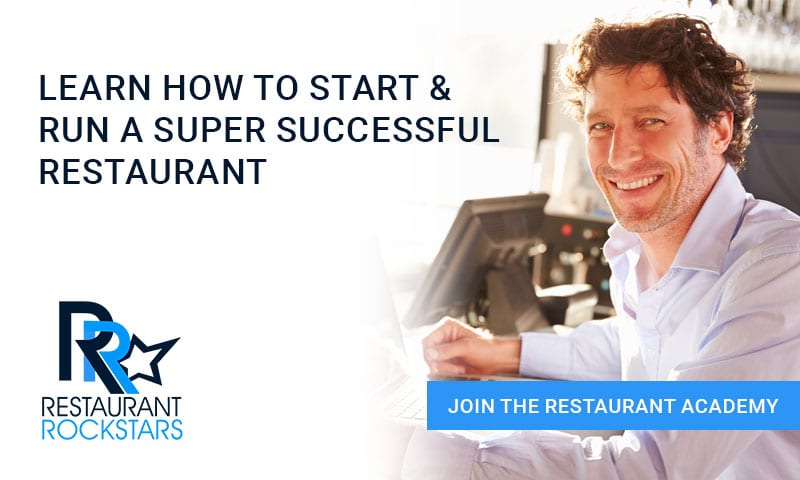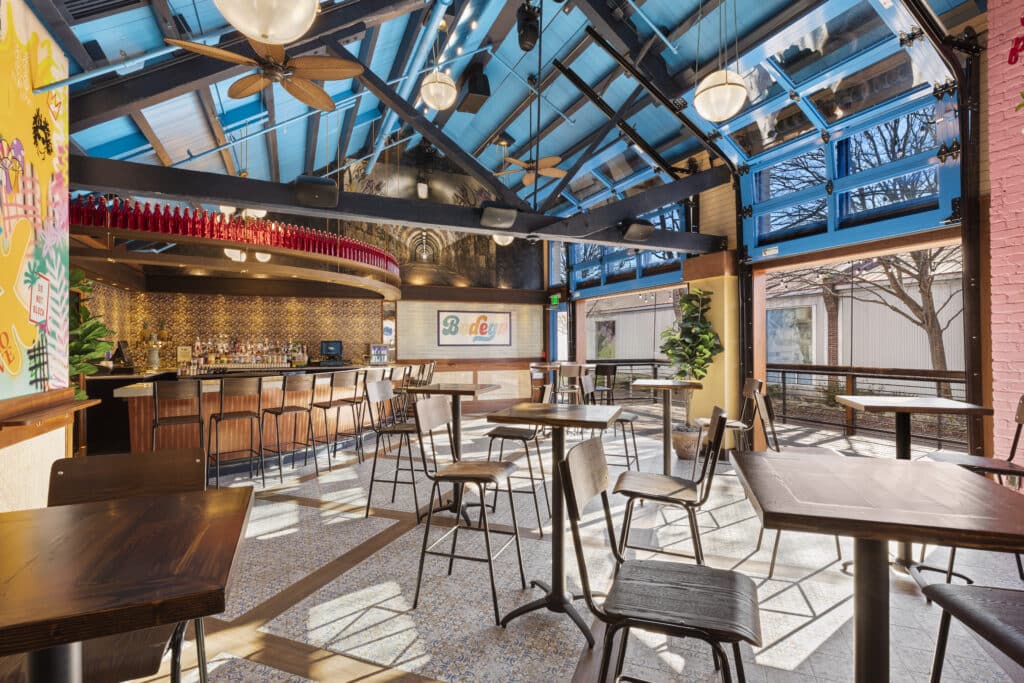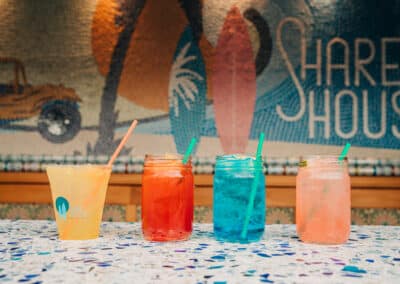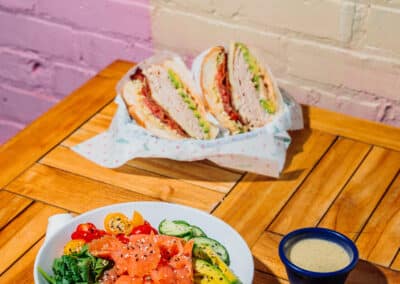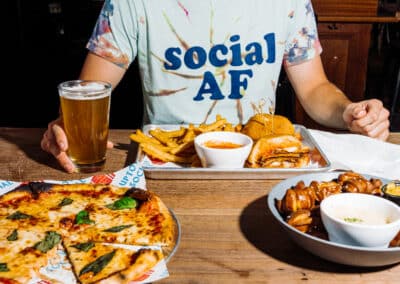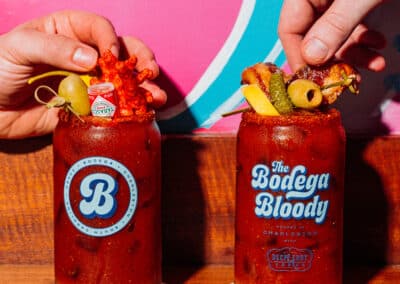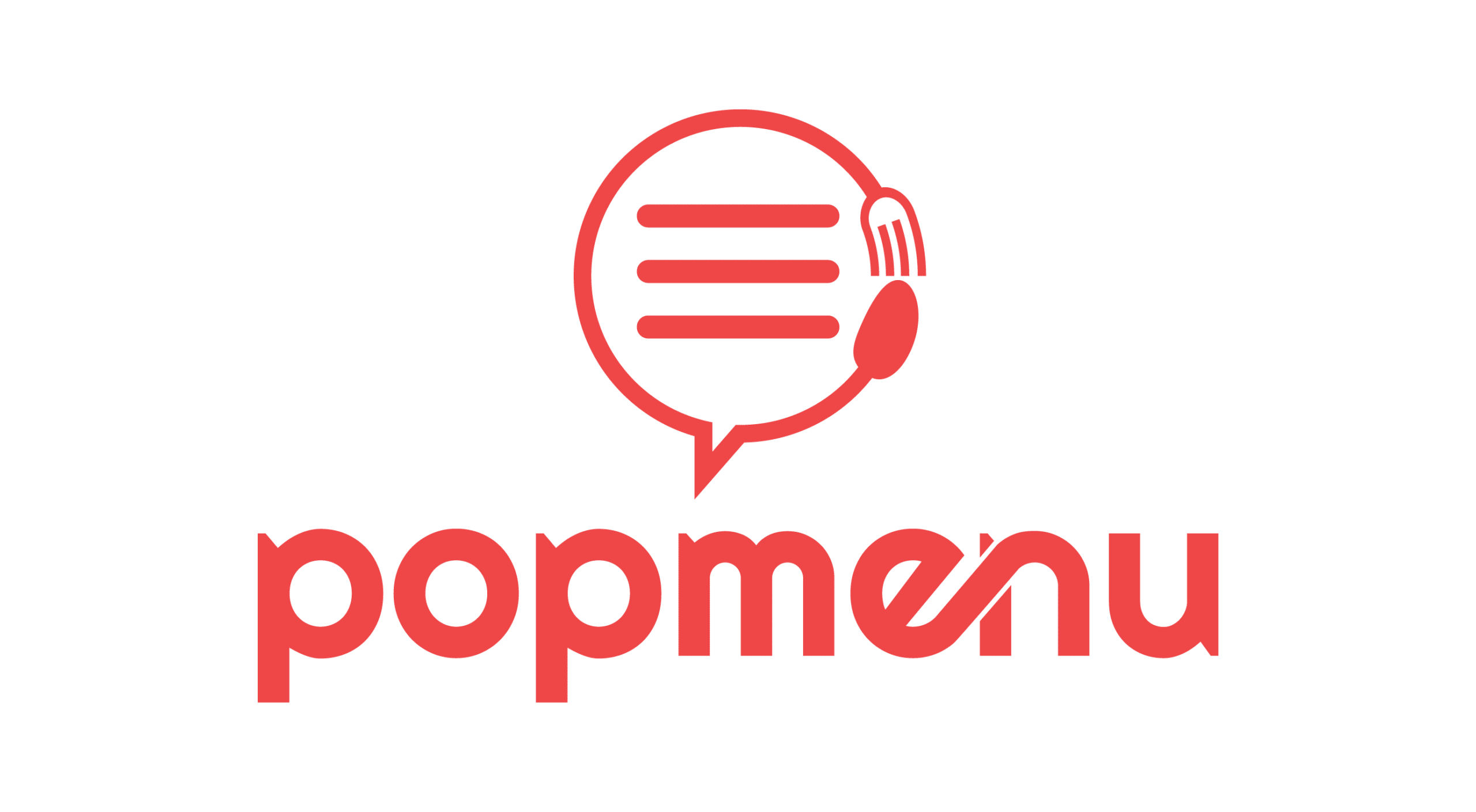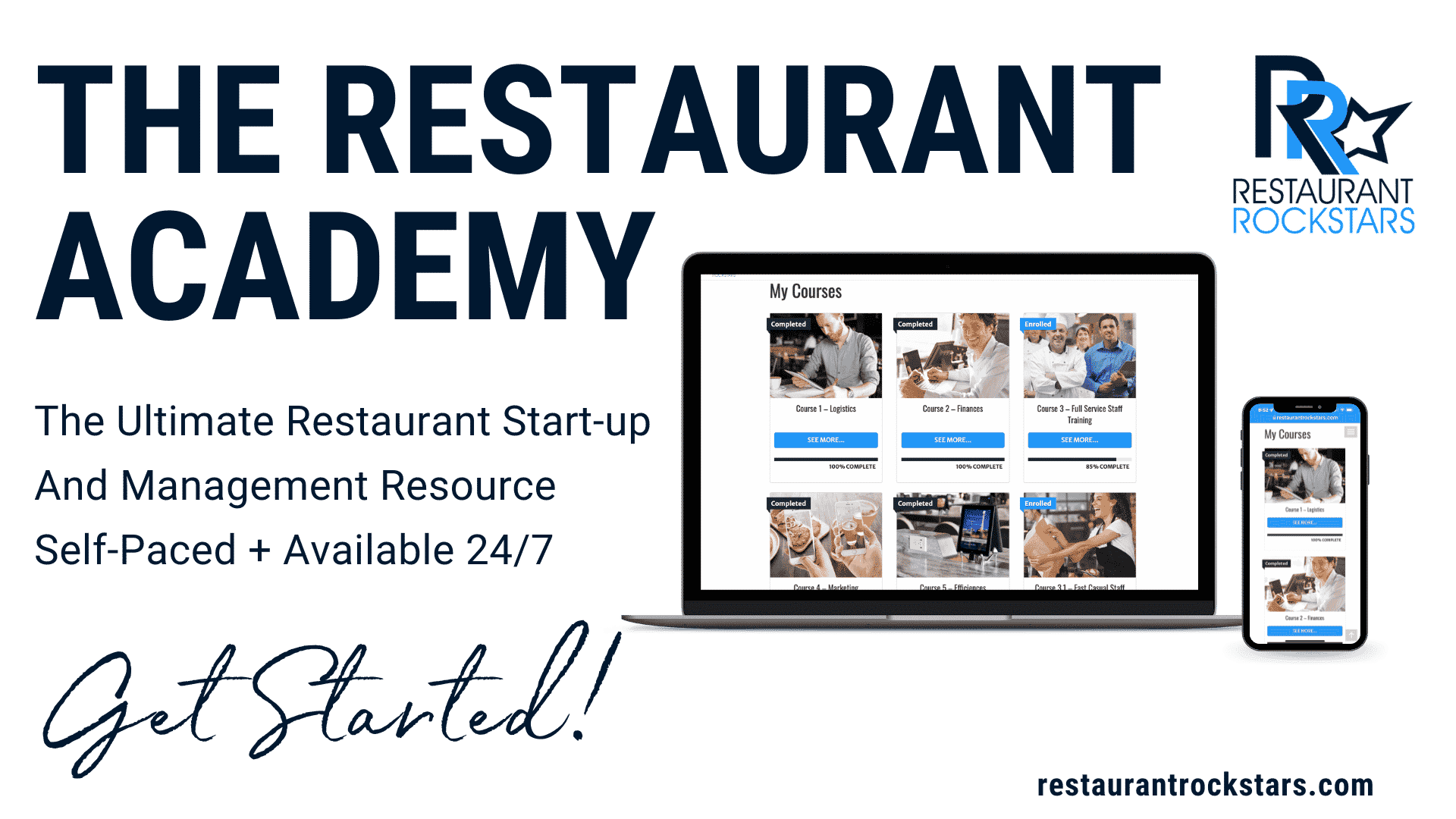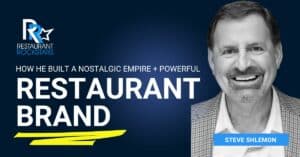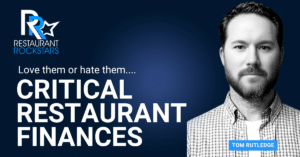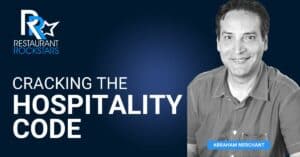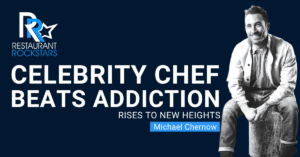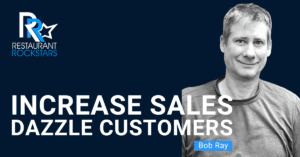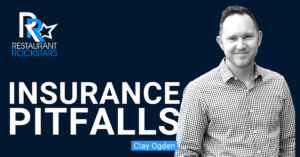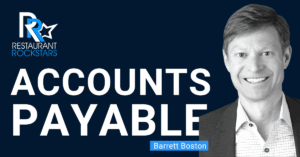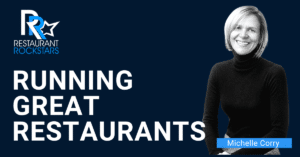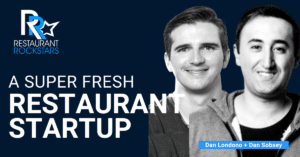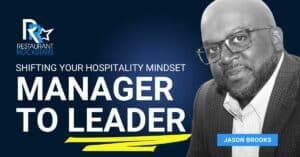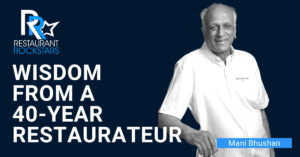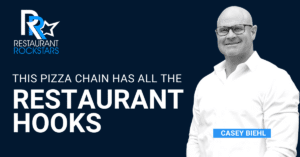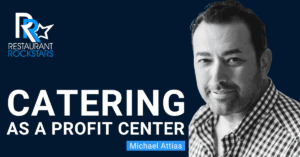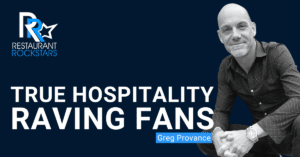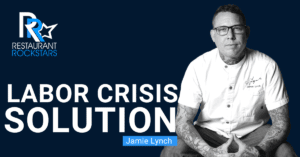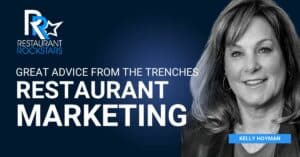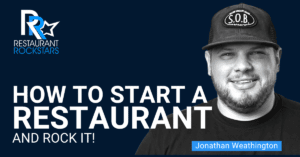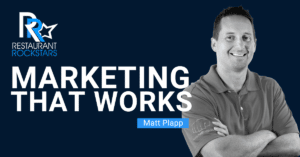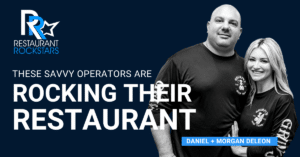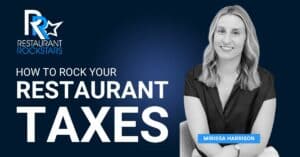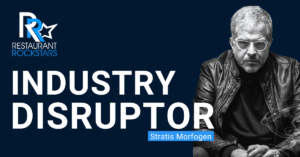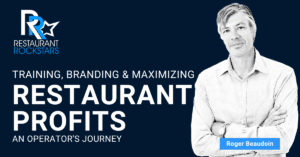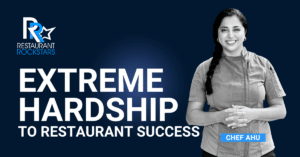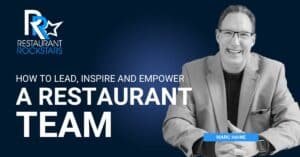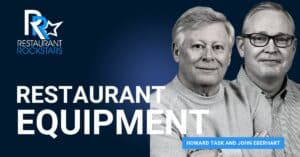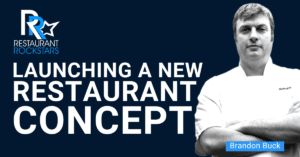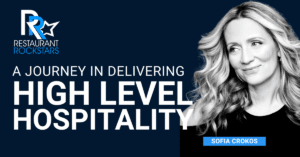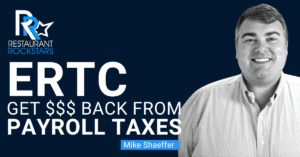Restaurant Rockstars Episode 360
How to Dominate Your Hospitality Competition
LISTEN HERE OR ON YOUR FAVORITE PODCAST PLAYER
It’s one thing to run a restaurant, bar, or club and quite another to run a business and dominate the competition. It takes vision, strategy, hospitality, and a powerful company culture.
In this episode of the Restaurant Rockstars Podcast, I’m speaking with Keith Benjamin of Uptown Hospitality Group and Eat, Drink & Be Merry, a dynamic restaurant, bar, and nightlife company with locations in NYC, Charleston, and Chicago.
Keith started his career in college creating big hospitality events, then did a stint in sports marketing only to find his true passion working his way to the top in the hospitality space.
Watch or listen as Keith tells us his hospitality story including:
- What it means to put it all on the line to invest in and grow a future in hospitality
- How to authentically become the “IT” spots for customers to go to
- The true meaning of Leadership
- Inspiring and coaching your team while having a full bench of future leaders.
- Doing the right thing, setting an example for the industry, and giving back
- Knowing and relating to your customer to provide the most fun experiences.
- Playing your best game, but always staying aware of the competition behind you
And of course, how to instill “Intrapreneurship” within an entrepreneurial business.
Don’t miss this episode, then go out there and ROCK your own Bar, Club or Restaurant!
Roger
Connect with our guest:
And I think that there’s something to be said for being in hospitality in that, you know, people think about it as the tremendous amount of hard work, which it is, and they think about it as serving food or drinks. But really, Roger, what everybody is doing when they go to sit at a table or sit at a bar is they’re looking to have fun.
Welcome back. I’m excited to bring you this week’s guest, Mr. Keith Benjamin is the co founder and a partner in two really dynamic nightlife operations groups, Uptown Hospitality Group in Charleston, South Carolina, and eat, drink and be merry in New York City. This is a story of intrapreneurship, which means, you know, taking pride and having passion and seeing a vision and you know, working for a place and seeing that it’s just a place where you fit and then growing a business and demonstrating to the people you work with and for that you belong, and that you’ve got big ideas and that you’re going places. This is a story of growth intrapreneurship that turned into entrepreneurship in two really dynamic communities. And it’s also a story of giving back and how this company gives back to the local community and is really a pillar about doing the right thing. It’s not just about making money. So we’re talking marketing, we’re talking about staff training, we’re talking about just giving everything to your passion and moving your business forward. So you’re not gonna want to miss this one. Thanks to our sponsors this week. Thank you audience for once again tuning in and on with the episode.
You’re tuned in to the restaurant rockstars podcast powerful ideas to rock your restaurant. Here’s your host Roger Beaudoin.
There are many elements to consider when growing your restaurant. are you connecting with diners enough and with the right message? Could your kitchen be putting out more orders than your dining areas have room for? Well, it can be overwhelming, especially when the reason you got into this business is for the food and the people. That’s why restaurants get pop menu. Pop menu is the marketing tech platform designed to make growing your restaurant easy, so you don’t have to grow it alone. With pop menu, you can capture more guests and their preferences through your restaurants website that’s designed to easily collect contact information and data so you can see what your guests love and why they dine with you. Connect and build authentic relationships with guests by using modern technology that personalizes marketing. Make all your systems work better together, improve margins and conquer the chaos of your restaurants digital presence pop menu as a special offer for my listeners. For a limited time, get $100 off your first month plus lock in one unchanging monthly rate at popmenu.com/rockstars Go now to get $100 off your first month at popmenu.com/rockstars
Listen when I ran restaurants, I had my core values the things most important how I ran my restaurants, monitoring daily operations training my team for consistently great guest experiences food safety, quality assurance and preventative maintenance. All this took a system. Well, here’s what Xenia can do Xenia gives you a modern app, really an operational base camp that scales standard operating procedures, trains your team controls operations, and even manages food safety. Now I really like their sensors that continuously monitor temperature for fridges and freezers so you can proactively prevent inventory losses. Now, how valuable is that? Now whether managing a single or multiple locations the Xenia app helps you ensure consistency, compliance and accountability across your operation. You can see full detail in real time from anywhere in your Xenia dashboard with automated reports right to your inbox. Now again, this was vital in my restaurants. Xenia is offering my listeners white glove service with free onboarding and implementation. So you can jump straight into immediate usage and value Xenia a start to just $69 per month per location. So get my special deal at www.Xenia.team/rockstars Xenia is spelled Xenia
Welcome comeback to the restaurant rockstars podcast so psyched you’re here and I’m super excited to introduce Keith Benjamin Keith, how are you today? Glad to have you on the show. You got a great story.
Thanks, Roger. Thanks for having me. I’m really excited to be here and looking forward to the chat.
Well, you know, I love talking shop with operators and you’re an operators operator, you got so much going on. So we’re gonna dive deep into your business. But it all starts with your backstory and hospitality. You can take us back as far as when you first got introduced to the restaurant game, or you know, and then we’re going to talk about the career, your career trajectory and how you got to be, you know, involved in these two really dynamic restaurant groups. So why don’t you take it back as far as you’d like to?
Yeah, for sure. So I went to Penn State for my undergrad. I always say undergrad I’d like there was a grad but there wasn’t it was just just just one degree undergraduate degree at Penn State and played the lacrosse was was in the in the throes of the college athletics world and really fell in love with with the university and the the party as a whole. I thought that going to a big 10 school was really a special experience and, and something that if you if you haven’t attended a big school, it’s certainly an experience that can’t be described unless you’ve you’ve been there and lived it.
Lion Pride. Huh? lion pride?
Yeah, yeah. Happy Valley through through
awesome. Okay.
Yeah. You know, when I got there, I joined a fraternity, I played lacrosse, and I immediately became the tailgate czar for my fraternity fraternity at Penn State. What that meant was that I threw parties each and every weekend for home football games. For about 400 people we had, we had a huge huge tailgate budget, get a pallet, we would get a pallet of beer back then it was natty light. And, and spent about $1,500 at the supermarket, which was a big haul. You know, certainly when you’re when you’re in college, and, and put a big party together, we’d get a DJ. And, you know, we were well ahead of our times in terms of the level of a party that we were putting together each and every week, and these big tailgate fields. And it was something that I really enjoyed. And I felt like bringing all these people together, for these big football weekends was something that was like, you know, really a unique experience. For me, it was something that I hadn’t done before. And I you know, as I was thinking about kind of where I was gonna go with my life, later in my college career, it just kind of dawned on me that I wanted it to continue, I wanted to continue to throw the party and to entrench my selves, myself. In, in, and amongst all of these people that were having a good time. And I think that there’s something to be said for being in hospitality in that, you know, people think about it as a tremendous amount of hard work, which it is, and they think about it as serving food or drinks. But really, Roger, what everybody is doing when they go to sit at a table or sit at a bar is they’re looking to have fun, right? That’s, that’s what it comes down to, you’re looking to have an enjoyable experience. And you’re looking to put a smile on your face, and you’re looking to leave whatever you have going on outside of that restaurant or that bar at the door, because we’re all looking for that escape. So going back to my days at Penn State, when I was throwing these big parties, I was seeing these big smiles on people’s faces, and I’m like, I need to keep doing this.
And thats gratifying isn’t it?
It sure is. so I graduated from Penn State, and I was living with my mom, my mom was in New Jersey. And, you know, like, like any post grad, I couldn’t wait to get out of my mom’s house. And I took a job working in sports marketing. And you know, where I was going to be throwing actually massive pre spring game events. I don’t know how familiar you are with the college football scene, but there’s these big spring games every every year and, and we were going to be throwing these big concerts and that was my job is to produce these concerts at major football stadiums all around the country. So it’s kind of my calling. But at the same time, I wasn’t making enough money. I was right out of school, I was making $30,000 a year. And I said, if I need to, if I want to get out of my mom’s house, I need to get another job. And my brother had worked for this group eat and be merry in New York City, previously known as NYC best bars. For about two, three years he bar attended, and he was like, Listen, if you need to make some extra money, I can introduce you to this guy. Danny, who’s a good family friend of ours wasn’t really an introduction. It was like, I’ll put you in touch with Danny because we didn’t know Danny forever. Danny runs off the wagon in Greenwich Village. And he could probably get you some work as a barback. So I started barbacking for Danny. At the same time, I was working for the sports marketing agency. This was 2006. Fast forward to 2008. And the world goes to shit.
Yeah I remeber the econemy just total.
it just it just crashed. And the agency I was working for folded. And the bar business didn’t right at that time. And like any other kind of crazy time in our history, people just continue to drink and they continue to look for that escape. And so I went to Danny and I said, Danny I need some I need some more work, right that my real job just tanked. And he said, Listen, you’re barbacking picking up some part time bartending work here and there. And off the wagon, we’re actually opening a new bar on the Upper East Side called the stumble in. I could use you up there as one of the opening bartenders and kind of see where that leads you. And, you know, no strings attached. You don’t have to stay with us forever. I said, Great. Let’s do it. And honestly, Roger, that was That was my real taste of the industry being a full time job. Because before that I was working a shift here and a shift there maybe one every couple of weeks to three weeks. I wasn’t, you know, fully in on it. But when I got to the stumbling, I was working three, four shifts a week, until four or five o’clock in the morning in New York City. Last call is 4am in New York, and so I’m not getting home until six o’clock. But, you know, at that point, you know, I’m like, Heck, half of my buddies are out of work. Nobody’s making any money. Here I am opening a new bar on the Upper East Side in New York City. It is packed to the gills. And here I am, again, like I was, you know, five years previous to that. throwing parties again, right?
Up in all the excitement of it all. and your the age group, too, right. So you’re you were the target demographic. So you could totally relate to the target guests and all that kind of stuff. You were one of those people you had thrown all these huge events. You are an event planner, you are hospitality deliverer, you are sort of a, you know, a networking person. It’s like you are making stuff happen. You are a marketing guy. It’s like all these skill sets came together. And you were caught up in the excitement of it. At that point, if you could go back in time to that moment, did you see a vision for how big this could get? And where you would ultimately go? Are you just having fun in the moment and saying, Hey, this is cool. I’m making money. I’m having fun. And life is great. Like, what was your mindset? If you can remember?
Yeah, I would say that. I’m kind of 50/50 to this day in terms of living in the moment, and looking years ahead. Yes, sir. Yeah, I try. I try to soak it all in I try to enjoy where I am. But I also might, okay, well, you know, where am I going? What does this mean for me, and, you know, at 40 years old, where I am now I have two kids, you know, a two year old and a nine month old and, and my wife and I are happy as can be. And we’re opening, you know, new spots left and right. But But I still think you know, what happens in five years. So going back, you know, back to 26 years old when I’m at the stumble in when I’m starting to think about the future Roger, I’m having, I’m having a ball. I’m making great friends. I’m building relationships. I have all these regulars that my coworkers are really my best buds. But, you know, my parents who are, we’re very special people in my life. They both have passed in the last three years. But they were incredibly inspirational for me in every way and
supported you every way believed in what you were doing. And it’s like they were your biggest fans, huh?
biggest fans.
My parents were to I’m sorry for your loss. I totally get it. Yeah,
thank you, Roger and everything that I had ever done to date, they had supported me and and I took a very unconventional path. To get into where I was at that point. I never had an internship in college, I went to be a camp counselor through all those years in college and all all of my parents friends said, Why don’t you get Keith something on wall? So my dad was a Wall Street guy. So they said, Why don’t you keep something on Wall Street? Or? Or if he likes events? And you know, why don’t why don’t you get him into an event planning. And they said it’s tough for me to get Keith anywhere. Keith is at Penn State. He’s playing lacrosse. He’s, he’s a he’s in a fraternity. He’s a happy guy He’s really doing well, Keith will find his way. And that was the way that my parents raised me. And that is the way that I will raise my children. I do not I do not believe in putting them in a box. So I was 26 years old. And I’m now bartending, Roger. So my parents say, Keith, you know, we put you through college. You grew up with a great education, and we supported you in every in every way. But what’s the future look like here, buddy? And I said, Listen, Mom, Dad, this company’s been around at this point. It was 2006. The company had been around for about 25 years. I said, you know, the growth is there. Should I want it? You know, Danny, our family, friends, a partner. There’s several other partners, they’re putting food on the table for themselves and their families. And, you know, I see a future but but you know, I guarantee you mom and dad, I’m not just in this to bartend. And, Roger, I don’t know if you’ve heard about the term the golden handcuffs. So Right. So you start, you start bartending, and it’s, it’s in the midst of a recession. And here I am making 700 bucks a night cash, you know, times for four shifts a week. I’m doing pretty well at 26 years old, right. And so the golden handcuffs and the thought of that in terms of like, just making all this money and never been able to walk away. Yeah, it’s very real. It’s a very real thought. It’s a very real concern. And so I said, Mom, Dad, um, I think I’m all in. I think I’m all in. So my, my manager and partner at the time, Danny, who was now running the Summerlin with another guy, Josh. They said, Hey, do you want to manage? And I said, Guys, no offense, but I don’t want to be a bar manager. I don’t want to be a bartender. I don’t want to be a bar manager. I want to I want to run the show. I absolutely. I absolutely want to run the show and you Going back to Penn State, I was the captain of the Penn State lacrosse team. And so leadership innately lives within my beam. And so I’m not
im glad your using that word, we’re gonna, we’re gonna get to that. But leadership and management are two entirely different things. And I already hear that you’re on that page, because it literally is about inspiration, and about recognizing talent and others, and about having a big picture vision and empowering those behind, you know, below you and all that kind of stuff. And you’re speaking volumes about that. So keep going. This is awesome.
I appreciate that. So, you know, I, I like to look at what I’ve built over the years, both for myself and for our company, kind of through the lens of being a head coach or general manager of a football team, or any sort of, you know, major sports organization. I think that there’s there’s a certain way that that that coaches go away, they go about their business that is so unique to their craft. And being a sports fan and an athlete myself, I’ve really kind of pulled inspiration from from listening to press conferences, watching people do what they do my own coaches, and I’ve done that myself. So going back to those days, I said, I don’t want to manage I want to be a leader, right? And what’s my opportunity here, in terms of growth, and Danny and Josh and the founders of this group, Michael, and Mitch at the time said, Listen, do you have any money saved up? I said, Yeah, you know, I’m a Jewish guy had a bar mitzvah, I put that put that to the side, my parents never let me touch it. I have a couple of bucks put to the side. And you know, I can certainly, you know, put something together, they said, start saving your money. And we’ll get you managing to really understand what the business is all about. And give it a year or two. And we’ll make you a partnership offer. So I grinded and grinded and grinded. And I came off the bar a couple nights, I was bartending I was on the floor, I was, you know, there until 5,6,7 o’clock in the morning, which is really hard. It’s a really, really hard thing to do to your body to your mind. There’s all sorts of booze all over the place, obviously, and temptation. And, you know, Roger, I’m very honest about this. But before my dad passed away, he was sober 26 years. So, you know, alcohol is something that I have always paid very close attention to and, and alcoholism, because it does run in my family. And so I really wanted to make sure that if I was going to go all in on this, that I had the mental fortitude and the strength to make sure that I wasn’t going to let the demons that are quite prevalent in our industry take over my life.
I get that completely. I mean, I had a number of bars myself that were part of restaurants, but they had big bar operations. And when you’re leading the show, it’s like everyone wants to be your friend, everyone wants to buy a drink, Hey, come on, you know, you can get sucked into that so easily. And just like yourself, I was I was able to avoid it. I mean, I’m not against alcohol, I believe it in moderation. And now there’s a certain liability aspect to having huge bars and stuff, which is the balancing point. But you’re absolutely right. It’s like so many people, unfortunately, in this industry go down that wrong road, because it’s so available, you want to be part of the action part of the party. You’re everyone’s friend, you can’t say no, it’s a it’s a real slippery slope. So thank you for taking that that stance and having the fortitude to be your own person and do what’s right for you. That’s great.
Sure, yeah, I appreciate that. So you know that the all of these thoughts are going through my head at the time and and and I saved up the money in in mid 2010, the guys came to me and they said, Here’s your shot, buddy, you can put in your first bit of money into the stumble inn on the Upper East Side, you’ll be the junior partner up there and have at it. It’s great. Here’s my money. I’m very poor immediately, right? I give them everything that I’d ever had and everything that I’d ever saved. My bar mitzvah money, my bartending money, my anything, right, yeah, here you go, guys. And it’s, it’s for 2% of the business 2% of the business, right. And so it’s like, you know, not big, but it’s but it’s my first step into the thing. So I put but at the same time Roger, these guys did such a wonderful job of making me feel like it was mine. And like I was genuinely a part of this even though it wasn’t right i was i only have this much of a piece but but it may go into work. Such a different feeling and such a different experience because I I knew that whatever I was working toward was putting money in my pocket, right. And so shortly thereafter, we signed a lease for a spot on the Lower East Side of Manhattan. This was you know, mid 2011. And now to be known as hair of the dog and hair of the dog. Yeah, it’s an institution now in New York City has been around since 2012. And, you know, made its way through the pandemic and we can touch on that in a little bit. But, but it was it was an opportunity for me did go down to the hair of the dog and run it as my own spot. And the guys kind of tapped me and said, you know, you’re doing great at stumbling, we see you growing, we see you with this, with this energy and this drive, we want you to go open this new location on the Lower East Side. And I said, Sign me up. So now I have a bigger piece of hair of the dog because I’m an opening partner there. And Roger when I tell you that this place came out of the chute on fire. I would be understating the success, it was just an unbelievable success. And, and I felt really good about it. And it was really just with a playbook that we had used for so many years. Because previous the hair of the dog, these guys, Mike and Mitch had opened seven other places in New York City. And so this was the eighth place. We had this playbook. You know, we had all the relationships with our reps with our vendors with our, you know, everything that we had going on. And mind you this was before social media, so everything was really word of mouth. You know, Facebook, Facebook had its presence, and Instagram was just getting going, there was no tick tock, no Snapchat. And so everything that we were doing, we literally people were coming in our doors, Roger, and we were giving them physical promo cards. So you’d come in, and you’d get all of our specials, you know, whatever we were featuring, and you know, half of them would end up on the floor. But I like to think that the other half ended up in someone’s coffee table. So when they’re sitting at home, you know, they grab the promo card, and they say, Oh, heck, you know what, I’m going to happy hour at hair of the dog this weekend. This was this was old school stuff. But it was only you know, 10 years ago, 11 years ago. It’s crazy how quickly our world has changed. But
would you say that was mostly related to buzz and reputation and the cool factor of you guys opening up all these interestingly different places, because let’s face it, it’s a super competitive environment in New York City, right? And you may remember, I mean, I was in college and a fraternity too. And this was at the very tail end of Studio 54. And my fraternity President rented out studio 50 for two years in a row through these huge parties, like what you’re describing, and it’s like, there were all these clubs happening then and it was an issue club for a minute and then it was the next one. But it’s like you guys sustained some kind of a you know, longevity factor a buzz, you had legs, it didn’t just it wasn’t a flash, you know, so did location play any part in this or it really didn’t matter where you located this? It’s like you were cool. Your hip hop and and and everyone’s gonna go to it just because?
yeah, no, location, location, location is is
It was still very important to you
Very important. Very, very important. We, we were fortunate to secure a corner spot on the Lower East Side of Manhattan, corner of orchard in Stanten, which is just like, the Are you familiar with New York City? Roger,
you know, it’s been a while I’ve been there several times. I know the East side, of course. But I wouldn’t be able to pick out the streets and say Stanton is this in the corner of no, I couldn’t tell you that. But I’m getting the picture. You’re bringing it to life for us. So
good. So it was it was you know, I will tell you talk about the Lower East Side for a hot second. It was a rough neighborhood. It was a really rough neighborhood in the 80s and 90s. You know, it was when you when you think about, you know how bad New York was. And I’m not going to get into the politics of anything, because that’s important here. But how bad New York was in the 80s and 90s, specifically, the early 90s. And unsafe. The Lower East Side was one of the real scary neighborhoods
is that bordering in the Bowery. It is it? Because when I was a kid, yeah,
like, yeah, yeah. It’s kind of like the nexus of like, soho the East Village and the Lower East Side.
Gotcha. I’m totally in that neighborhood. Now. Go on.
so it was a scary place. And sure enough, you know, it’s funny, talk about gentrification and how these neighborhoods grow, and they change. Michael Che is a comedian on Saturday Night Live. And he tells a joke about how he’s actually he grew up in the lower Eastside and he tells a joke, I’m not going to get it right. So I’m not even going to try but how how a bad neighborhood is a bad neighborhood until a cupcake shop opens up and then all of a sudden, it’s a great it’s a great neighborhood. Yeah, it’s, you know, I’m sure you can Google it, but it’s a really funny bit. And sure enough, there’s like this, this this this bakery on the Lower East Side called sugar sweet sunshine. And, and then there was all these other restaurants that opened down there McNally restaurant. which was a tao restaurant, Tao group restaurant. Yeah, yeah. And several other bars and restaurants were just opening up. So So I would say from like, the early 2000s, straight through to 2011. When we signed the lease, we got in at like, the peak of the Lower East Side growth. So Location, location, location, so fine with, you know, 30 years of history at that point, right. We started our company in I guess it would have been 9101 2000. There would have been 20 years at that point. So 20 years of history in New York City seven Previous locations that have done really well in many different neighborhoods, and here we are our newest location, the NYC best bars group on the Lower East Side, here we are. And it just came out of the chute like I said, so what I did at that point Roger was I said, Okay, I’m now you know, the operating partner at hair of the dog, we’re doing great. I’m a minority partner at the stumble in Michael and Mitch asked me if I want to get, you know, small pieces of a couple other spots. Of course I do. So I get a small piece of the 13th step in East Village and down the hatch, which opened in 1991, in Greenwich Village. And I’m like building my, my portfolio, if you will, right. But I’m like, these bars are great, but I think they could actually even be better, right, they can even be better. And so what I was doing was I was going out quite often. And I was trying to kind of pull from different experiences I was having at other other bars around the city. And I’d seen kind of the growth of, of the DJ experience. And when I talked about the DJ experience, it has transformed in such a way over the past 10 years or so that I never could have imagined, right. So at that point, our DJs at our bars were what I would call a laptop DJ, they were coming in with their with their with their MacBook, and they were jumping in into the DJ booth. And they’re plugging in their MacBooks and putting on the headphones like you have on and they’re sitting there for eight hours, just on iTunes just moving songs around, right. And people are dancing, they’re singing, we have our like, you know what I call like the wedding playlist that would hit every night, you know, shout and living on a prayer and, you know, whatever, right? All the Sing along journey. But then I’ve gone to some of these other bars and I see see, like real DJs right on mixers. And they’re doing that doing the spin thing. Yeah, they’re doing the spin thing, right? And I see like, you know, I see people really vibing right. So it’s more than just like a sing along. It’s a vibe, right? It’s a vibe. And so at the time, we were playing it paying our laptop, DJs 15 bucks an hour. And they weren’t they weren’t given us good music. But I said, we need to pay more to to get a better experience. And so I went out and I found some some, some really real DJs pay these guys 50 to 60 bucks an hour and on a dime, Roger, it just changed the experience of hair od the dog. So a place that was already doing really, really well. Now we had an elevated entertainment component that was just upping our game even more. So
did you have to uplevel your sound system at that point, or you were already set up with the top equipment and the sound was going to be great. You just needed to take that DJ thing to the next level,
we needed to take that Yeah, we actually had a great install. So our our AV was where it was at that time where it needed to be. And it was just really a personnel decision. Right? So moving this person out for this person, and it made a big difference. And I was really excited about it. And and it got me kind of thinking about the bigger picture, right. So Michael and Mitch had started this company in 91. They had built it, they’ve given us the playbook. Well now. You know, I have a pen next to me. They’re letting me kind of rewrite the playbook a little bit, right? They’re like, hey, Keith, you’re 29 years old, 30 years old, you kind of have a different way of looking at this thing, right? So Have at it, do your thing, whatever you think might work, it might make us all more money. All ears right?
The term for that you are an intrapreneur is what you were. But you were also an entrepreneur, because you did have a minority stake in this business and you had an ownership piece of it. But I love that term. Because when when you’re a true leader, and you recognize talent, someone and you just like trust in them, they have good judgment and good ideas and just run with stuff. And they take on that energy and they go and they deliver. I mean, that’s being an intrapreneur in someone else’s entrepreneurial business. So you had a combination of both things. But this is all really great stuff.
Yeah, thanks. Yes. So. So I’m now rewriting this playbook. At the same time. Things are getting tougher and tougher in New York City. So we’re getting into 2015 1617 rents are just skyrocketing. Minimum wage is skyrocketing. And it’s just becoming harder and harder to do business, small business, lots and lots of headwinds. We’re all kind of sitting around this table, many partners running all these different locations, Mitch and Michael. And we’re like, hey, what’s next? Like, how do we grow this thing? Right? And how do we grow in New York? And nobody really had an answer. And so here I am at like, in my young 30s. I’ve been married once before, previous to my current marriage, and the marriage actually wasn’t going all that well. And I’m at this crossroads Roger, Roger, because I’m like okay, here I am. Well, working for Mitch and Michel, they started the company and we have we have we had and have just the most wonderful of relationships. They’re my mentors. They’re my buddies. They’re my brothers. They’re everything to me. But at the same time, I’m like, how am I going to grow if I just kind of sit in the city and wait for whatever might be the next opportunity. And so at the time, it was 2016. And I had done some research on Charleston. And I said, you know, I’d spent some time down here. And, and, and I saw that Charleston was growing and growing and growing and growing. And it was becoming this culinary and nightlife and tourism kind of all in one Mecca, being named the number one travel destination in every major hospitality editorial out there. And so I’m like, gosh, there’s something going on there. And I’ve been down and I kind of struggled to find bars that that were anything like what we were doing. And so I put together a presentation, and I pitched my partners. And I said, Hey, I’m kind of at this crossroads in my life. And while I’m really kind of happy to hear the dog, I’m not happy enough, I’m not really satisfied. And I said, I put together a presentation with with median income with tourism numbers, with college students, with visitors with locals with a number of folks that are moving down to Charleston daily, weekly, monthly, yearly. I think we got something here, guys. And it’s not a 4am license. It’s a 2am license. But I like I like what I see. And they said, let’s go take it, take a look. Right away. They didn’t tell me not even for a second Roger, they said, let’s go take a look. And within days of me presenting them with this idea. We were on an airplane in Charleston on a Saturday, in the middle of April 2016. It was what I call a bluebird day, not a cloud in the sky. 75 degrees, absolutely pristine weather. And we bar hopped and I mean, we did our version of r&d, we hit bar after bar after bar after bar. We weren’t there to open, you know, the next husk or halls. I mean, there’s some phenomenal restaurants down here. We’re not true restaurant tours, were by trade were nightlife operators. And so we were looking for that opportunity. Right. And so going, bar hopping was what we needed to do to get an idea of what we were really looking at. And Sunday morning, we woke up, we were a little groggy, we, you know, we did it the right way. We hit all the spots, we stayed late. And we felt like there was such a tremendous opportunity here. King Street, Upper King Street is the main drag in Charleston, and there was just line connected to line connected to line connected to line out every door. And so that tells us that there’s there’s all these people in the streets, they need somewhere to go right, they need another place. And so by Monday morning, we met with a realtor that we had found and we were looking at a number of different places. I’m currently sitting in uptown, social, and we saw uptown social in 2016. And the room that I’m in right now you see the rafters
I do it’s beautiful.
It’s a gorgeous space.
Is it an old warehouse by any chance?
it’s it’s an old building dating back to 1915. And Charleston does a wonderful job of preserving its architecture. And so when we walked into this building, it had been vacant for many, many, many years. I mean, these are original rafters. And in the room, I’m in the second floor and the room that I’m sitting in, I looked down, and we looked straight down to the first floor. I mean, the built, we were walking on wooden planks it was it was hairy, and but at the same time, you know, the funny thing is Roger, we were really when we came down here and Mitch and I at the time, we were looking at a spot to resemble hair of the dog, which was all in the main floor was about is 2800 square feet. And we had a kitchen, that hair of the dog. And then we had a basement with all of our storage and our office space. But what we didn’t realize in Charleston is that because we’re in the low country, and there’s all these flooding risks, there’s no basements. And so a 2800 square foot spot isn’t enough space, right? Because you need kitchen storage, bathrooms, et cetera. And all of your back of house space is now eating into your front of house space because you don’t have you know, this, this, this downstairs level to utilize in that back of house realm. So we went from looking for this small little spot to a much bigger spot. And you know, when we walked into uptown social Mitch and I said, we are absolutely out of our minds to take this spot. It’s 10,000 square feet. It’s two levels. It has a roof type roof deck. And it’s in a city that we have never spent more than a day or two in but we’re out of our minds to not take the spot, right? It’s on opera King Street. It’s like two blocks north of the closest bar. So we’re going further north to an area that hadn’t really yet to have any real restaurants or bars or hotels. There was like one hotel going out. up and one hotel across the street. But it was like really kind of uninhabited at that time. And previous to this, Mitch, really liked to find spots in neighborhoods that had been established. So this was very kind of out of his comfort zone, which is important. Mitch is about 20 years older than I am. So he’s been in the game a lot longer. And he’s, you know, tried and true and in his approach, so I had to really be like, hey, Mitch, like, I think there’s something here. And I think that the risk is worth it, right? Because if if it hits, we’re looking at a big hit, we’re looking at a really, really big hit. And if we’re looking at all those lines, just a couple blocks south of this building, there’s nothing to say that people will just make it a little bit further north. So that was mid April 16. And a week later, we had an LOI signed for 10,000 square feet in a city that we had never ever spent time in. It was crazy. It was the definition of absolute insanity.
True hospitality and guests convenience are vital in your restaurant. I’m proud to say that for 23 years, my restaurants provided both with paging equipment by J tech. We use guest and server pagers and my team’s could not have delivered great dining experiences without them. J tech systems help you run a great restaurant. Now J tech pages are reliable, durable, easy to set up and operate. Guests pagers, increase sales and give guests peace of mind knowing they’ll be called when their tables ready. Staff pages notify when orders are up fresh and ready and save time by eliminating the need for service to check on orders. J tech also offers Motorola two way radio solutions, QR code virtual paging, reservations management, curbside notifications and coming soon LinkWare a wearable watch like smart band that can receive messages and tasks from the J tech LinkWare application. Now I saw this product at a recent food show and it’s really cool to learn more and get a special offer from J tech exclusively for my listeners, go to www. jtech.com/rockstars. That’s spelled jtech.com/rockstars.
You like the vibe of that community, you could see huge opportunity you like the lifestyle you like the climate, you immediately move your family down there. And you said we’re just changing our life 360 from Manhattan and we’re going to Charleston?
Yes. So kind of, you know, there’s there’s some truths to that, for sure. You know, I saw something like I said my marriage was going south. So this kind of all happened at the same
Oh, this wasn’t your current family. I’m sorry.
Right, right. ,I had no children at the time. And so I really kind of had the ability to to, and my ex and I ended up in July. Yeah, it wasn’t anything too crazy. But we said, you do you all do me? I think this Charlson thing really makes a lot of sense for me. And we went our separate ways. And Mitch and Michael were like, Hey, did you know we’re no longer buying into 2% of the business? I’m going all right. I said to these guys, if we’re doing this, we’re doing this together. Right? So you talked about intrapreneurship This is now me graduating to entrepreneurship. And it was it was my kind of what I looked at Roger as my one shot. This was my one shot at 3233 years old to kind of chart my own path. And, and it was a huge risk. I mean, I didn’t have the amount of money I needed not even close to invest in this business. I begged I borrowed I didn’t steal but you know, I did everything I needed to do from friends of friends and family. And so phi i don’t know if you’ve heard of so phi, but it’s a small personal lender. And so if I was great, they lent me 100 grand on a seven year amortized loan. I mean, I went everywhere Roger to find the money I needed to invest in this place. Now if it tanked, I was up shits creek without a paddle. There was no shot. I was recovering from this. This was the risk of all risks. The other crazy thing was that I started to bring other folks down with me from New York. So I brought down Kara Graves, who is now my business partner have probably over six years. Great little story about Kara. Her dad was a NYPD warrant squad detective. He was a regular of mine at the stumble in with all of his co workers and other guys on the warrant squad. Bobby Kara’s dad used to come in after work at burgers and beer, whatever. And one day Bobby said to me hey, my daughter Kara just graduated from college. She’s bartending in Montauk a little bit you might give her a shot. I said to myself, There’s no way I’m giving this girl a shot because if I ruin this thing, I lose all my cop buddies. Well, I met Kara. And as they say, the rest is history, Kara has been with me either as a bartender manager or partner for 11 years now, and she’s my, my right hand man. And she and I are actually thickest thieves when it comes to the marketing and social media component of our entire company’s growth.
So you avoided you know, partnerships rarely work. But you obviously had a track record of very successful partnerships with, you know, the first the two guys and you know, Mitch and all that sort of thing. And now with Kara, it’s like, you’ve just is it just chemistry right off the bat, a common goal and universal thinking here? Like, what’s the secret to a successful partnership that works and lasts without differences of opinion? And I think we should do this? No, I think we should do that. And it’s like, you know, I’m not making enough and I want more money, you know, people in fight when, when everything’s on the line, especially when, you know, things aren’t always an overnight success. So when there’s stresses involved, you know, it’s like a volatile cocktail. What’s your secret to success with partnerships? Because it’s clearly working for you?
Yeah, I mean, listen, I’d be remiss if I didn’t sit here and say, it hasn’t worked for everyone, that’s been a partner in our group. I mean, there’s, there’s the company has been around since 1991, there’s been some folks that have been a part of it, that are no longer a part of it for whatever the reason might be. But the majority of our partners have been around, you know, for a good part of that time. You know, Mitch and Michael have felt like from day one, when they started the group, that if you give people an interest in the business, they’re gonna care about the business, like it’s their own right. And so you know, that, that, that level of thinking, that notion is, is so accurate, right? Because here’s so many managers are in our business, that are working longer hours than anybody else with no skin in the game, and they’re like, why am I doing this? Why am I doing this? I’m making money for the guy who’s sleeping at night. And, and I’m doing all the work, right. So here, here, these guys started with this very unique buy in strategy. And it works from day one, kind of what I did Roger is I built upon that. And when I started bringing folks in, when I moved to Charleston, and over the past six years, I’ll give you an idea. When we opened here in Charleston, we had three local partners, boots on the ground, not including Michael and Mitch, who, splitting their time between New York and Charleston, three local partners, including Cara, today, and heading into 2024. Because the partnership kind of we at times make certain percentages available, you know, based on maybe some people selling the point here or there or dilution, whatever that might look like. But heading into 2020, Ford will have 14 partners here in Charleston, 14 partners and what I attribute that to Roger, and I go back to really kind of my my inspiration pulling from, from athletics and from coaches and general managers, culture, right. There’s
that question, tell us about your company culture. This is a perfect segue into that, and you brought it up. So take us there.
Yeah. So I just believe that in order for your business to be successful for your team to be successful, it starts from the top right. And so, you know, Mitch and Mike were awesome. They more or less gave me full autonomy. When I moved down here, and we’re equal partners. I have this chip on my shoulder that I that I’m that I’m here to do this here to prove myself here to be the leader, right, we talked about leadership. Now I’m the leader. Now, I’m solely in this leadership role. And I have people who are looking to me to show them the way, not only are they looking to me to show them the way, but they’ve put everything that they have on the line, right. So it’s not just me and my money, and all of the stuff that I’ve borrowed. It’s all these other folks that have put their lives on the line. And so I took that really, really seriously. And, and we got all the we’ve gotten together over the years, and we’ve been in the trenches together. And as we build this thing, it’s really with the idea that we’re here to really do a job but have fun, right? This goes back to what I was talking about. Roger, back to my Penn State days, we’re here to have a good time. Right? If we didn’t want to have a good time, we would have been not nothing against being a lawyer. But we would have been a lawyer, we might have been a doctor, we might have been in real estate. I mean, I don’t know not to say that these jobs aren’t awesomely fun in their own right, but like, Roger, here I am at Uptown social and Upper King Street in Charleston, where my job daily is to show people a good time. It’s really awesome, but it’s an awesome responsibility right here I am with like, you know, 10,000 square feet with I would argue the number one nightlife spot in Charleston, if not the whole Southeast, I mean, it’s really become quite a destination. But with that comes the responsibility of following through every single time. And so we have countless manager meetings, social media meetings, marketing meetings. I mean, the infrastructure of our group has grown in a way that I never could have imagined. We now have not just uptown social, but we have another nightlife spot called sharehouse. We have a breakfast and lunch cafe called Bodega inspired from our time in New York City. Really, that focuses on in New York style brunch and breakfast and lunch sandwiches. We’re opening a second Bodega in Mount Pleasant, which is right over the bridge in Charleston, and then we’re opening another bar nightlife spot around the corner from Uptown social. So in the span of six years, we will have opened six locations in the Charleston area. this can this can only happen with the people that are happy to be part of the growth. And so going back to culture, you know, we have we have an amazing level of communication. I think a lot of businesses fail, because the communication falters somewhere along the way. So I encourage you know, I have my phone right next to me here, I promise, it’s been turned over so that I’m not looking at it. But we’re I’m in a million different text groups with my team, we’re meeting daily, we’re talking daily, we’re encouraging one another, I really have kind of this open forum in terms of ideas, I want, you know, I’ve built our group down here with a bunch of younger folks. So at 40 years old, I’m the oldest partner here in Charleston, the average age of our partnership here in Charleston is 30 years old.
Let me ask you a question. That’s, that’s amazing. Everything you’re saying is, is really so incredibly inspiring, and so totally cool. But upper, my uppermost in my mind right now is I had, you know, I had several places, but my biggest place, you know, pretty soon, the alcohol sales took over and became bigger than the food sales, and it grew, and it grew. And then we brought in, you know, we tried the DJ thing. And that was a huge failure, we brought in live bands, and we grew this huge bar business based on, you know, rock bands and stuff several nights a week. And with that came a security team and bar fights, and I could tell you stories about being in plenty of those. And then there was the liability issue of building relationships and, and building such repeat business with people that became your friends that would drink but then a lot of those people crossed the line a little too often. And now suddenly, you gotta shut people off, or you can’t shut people off based on the relationship you have with them. And the following that they have in this big friend group, and suddenly you tell them no, and then they take 30 or 50 of the friends and now we’re gonna go somewhere else. It’s like, how do you deal with all that when you grow and you grow, and you grow, and you have this huge, you know, nightlife operation going on you you’re crossing that on a daily basis without crossing a line. Public safety is super important yet building the business is important. And, you know, you know, I’m saying, how do you guys deal with?
Roger I mean, you and I could talk for another, we could dedicate one hour to that question, right? That’s, that’s, there’s so many, there’s so many layers to peel away there. But I’ll kind of give you the short answer. When I moved down here, I took it upon myself to not just operate a bar, but to become a member of the community. I met, I met, I would call it around 50 to 100 people, before we even opened our doors, pillars of the community, both in politics, and in f&b. I wanted to know everyone that I could possibly know, I would meet one person and ask them to introduce me to the next and so on and so forth. So I moved down here in December of 17. We opened in April of 18. I was taking multiple trips before that, but I was just meeting and meeting and meeting and meeting me. And it was what you know, here’s what we’re doing. But how can I give back. And as we’ve grown this, this company, Roger, you know, my profile has also grown a bit and and I’ve been fortunate enough to be in this small town, right? You come from New York City, where you know, there’s a million operators and you know, a bunch of people get lost in the lost in the shuffle. If you’ve got some successful businesses in Charleston, people are just by nature gonna get to know who the owners are. Right? And so I become really involved so we have these, you know, I talked about the DJ component at, at hair, the dog and how that kind of inspired me to want to get bigger and bigger. We now have these massive productions every weekend at Uptown social and sharehouse. We fly DJs in from other parts of the country. We bring in bands who open for the DJs we have them sitting next to our rooftop. We have a rooftop DJ, we have a DJ up here in this private room called the Cooper room which opens to the public. We have a DJ downstairs a band, this place uptown social and sharehouse is just a nonstop entertainment shop. Right. Right. So but but there are the public safety concerns there are the liability concerns there are the concerns of how are we going to give back because now we have all of these folks that are visiting our locations and are contributing to the overwhelming success. Where do we come into play? How can we help give back to the folks that are given so much To us, right? So about two or three years ago, I was probably two years ago during the pandemic, when there was so much in flux. I was asked to join the board of the Lowcountry hospitality Association, which works in tandem with the South Carolina Restaurant and Lodging Association. I’ve since joined the executive committee of that association, and worked very closely with local government and state government on whatever our concerns might be interest me there were many during COVID. But there have been many afterwards, right. The latest concern is is insurance right liquor liability insurance and what that looks like the joint several liability, which is a liability insurance here in South Carolina, which is a really tough thing to deal with. And once again, that’s that’s a story for another day. And then recently, I joined the Charleston Wine and Food Festival board of directors as well. And what that festival does is it’s over approximately 100 events. One weekend, the first weekend of March, it’s culinary driven kind of less nightlife, but it gives me that opportunity to get into a different part of our business. It’s a 501 C three that gives money back to the f&b community. And the other thing that I did, not exclusively but when my dad was diagnosed with ALS, and in 2019. I started a fundraising campaign called motivated to move, which raises money for families dealing with caring for loved ones with ALS. There, unfortunately, our folks dealing with ALS all over the world. There are folks here in Charleston dealing with ALS. And in 2019 Our first event we raised $35,000. It kind of what was put on the backburner during COVID, we did our second event this year in 2023. We raised $60,000, for folks caring for loved ones with ALS. We’re now in the process of trademarking motivated to move starting our own 501 C three. And giving back to that community. I work very, I work very, very closely with the mayor’s office, with Charleston Police Department, I want to do everything that I can to blaze the trail for the other establishments that might not be as focused as I am and doing it the right way. Because with all of these people in and out the door through our turnstiles, we need to set the example. And I don’t take that lightly. And I talked to my team about it all the time. Yeah, we’re here to show people a good time, we’re here to have fun ourselves, we’re here to have our guests have fun themselves. But if people aren’t safe, then we shouldn’t be doing what we’re doing. And so we have 10 guards, you know, he talks about security, we have 10 guards, on a Friday, Saturday night, for you know, approximately five north of 500. Folks, that’s our occupancy. So you’re looking at, you know, two guards, for every 100 people. We have two partners and a manager on every single Friday, Saturday night. And we’re all just hyper aware and zoned in on every aspect of our operation. I don’t work nights anymore. I really don’t work weekends as much as I used to. But like I said, Roger, I am so obsessive about what we are doing and how we are doing it and making sure we’re doing it the right way. And that ties back into our culture, that that don’t let anything really fall through the cracks.
God, it’s so great. The unexpected in this business is always around the next corner. But if you take all those precautionary measures, and you instill that in your team, and if that is paramount, and if you become a pillar of that community setting that example for others, you’re just up leveling, just hospitality so much. And, you know, and just building a reputation for it’s not just about the money, you know, sure very successful, but it is about giving back and making this a better place. And community for everybody, our guests, or customers or vendors or partners like everybody, it’s like that that spoke volumes right there. So that’s tremendous. That’s great. It can’t you’ve sort of gotten your own exit strategy. It’s like this business can take it down deep if you’re doing the late nights and you’re surrounded by alcohol all the time. And it’s like you’re partying nonstop. It’s taking a toll on your physical and mental well being and it sounds like you’ve been able to find that bounce exit out of it, but still have the big picture and lead the people forward. Let me ask you a question about onboarding and staff training and, and where that comes into play. Because it seems to me like you’re looking to hire people, much like yourself with those same philosophies that bring a certain amount of character to the table. You know, willingness and ability and desire to serve the public, all those things, but Well, yeah, what do you look for? And what’s your interview process? Like?
Yeah so, you know, in my in my role that has developed in the way that it has I don’t actually do the hiring as I used to. But folks
in general, yeah, Just show us what your company looks
Our company ethos, is is to hire people that that we want to be our partners. That’s that’s just that’s just how we go about it, right? Because if we’re gonna grow this company that way we are, I always talked about, the only way to scale, the only way to grow is to have the people and to have the bench right to use a sports analogy, to have a deep bench, if we don’t have a deep bench, we simply cannot grow. And so I challenge my team to say, Would you want this person and of course, you know, you’re hiring somebody to, you know, flip cheeseburgers, you know, maybe it’s a different hiring process than the person who you’re hiring to be the front facing individual that standing at the door, working the tables, working the service working behind the bar, but not to say that the person in the kitchen isn’t equally as valuable. But you know, the process in general Roger is to look at somebody that we want to work shoulder to shoulder with, for a good period of time. And what’s been so awesome, is that we’ve had a few people that started as either security guards, or barbacks, who are now our partners, right. And so now the cool thing is that we’re in a college town, there’s the Citadel and College of Charleston, and people are graduate working for us in their college years. And they’re graduating, they’re telling their parents who just dropped 200,000, north of $200,000, on their college education that they want to stay in Charleston, to work with the Uptown Hospitality Group, because they see this feeder system, if you will, of working as a barback. And then working as a bartender
and you prove that to be true yourself. And that is now sort of a benchmark for what others can do. It’s so interesting, because you don’t need a formal education, you don’t need to go to a great college, you don’t need to go to college at all, if you got the right stuff, if you got that passion, if you want to be mentored and learn, and put your best foot forward, you can do to the absolute, you can own an empire in this business, you know, and I’ve seen that happen, I’m sure you’re seeing that happen, you know, on a daily basis in your own company. And you’re an example that yourself,
I will say that what I’ve learned through through the years is that, you know, you don’t have to be college educated. But I do feel like the way that we’ve grown our business and the people that I generally genuinely relate to best are the folks that have a certain level of a higher education. I just think that being a good writer, being a good communicator, and I’m not saying you need to, you know, be a master on Excel spreadsheets or having, you know, an economics degree or, you know, be an accounting guru. But I think that having that experience, I was a broadcast journalism major, with an American Studies minor. I mean, what am I doing with that other than talking to you today,
communication is what it is, but like you said those are life skills that are necessary skills.
You have life skills right. So to have that experience, that four year, two year four year for me, it was five year, I tore my ACL at Penn State and I redshirted the year I stayed an extra year. But to have that experience, on campus with all of these different aspects of the college experience, I think really benefited me moving forward.
I would say the same for myself. I agree with that. Awesome. So. So let’s talk about what’s your future plan? I mean, where do you see this company going? Because you can you’ve proven that you can take a concept and take it to a new market and make it work. And you don’t necessarily. Well, let’s go back to competition. Remember, we talked about tremendous competition, this business, whether you’re New York City, or Charleston, it’s like people are doing their best game and you’re playing your best game? Do you keep an eye on what the competition is doing? You Zig when they zag and all this other kind of stuff, but you have a pretty good pulse or a handle on what’s going on in the community. But you’re trying to stay cutting edge and you’re always ahead of the curve. It sounds like can you say that philosophy?
Sure, I say to my team, each and every day each and every moment we sit together I say complacency is our biggest enemy. So here we are, what I would say at the top of the mountain here in Charleston, we’ve really, really worked hard, really worked hard. But Roger, when you’re on the top of the mountain, you look behind you. Everyone’s climbing that mountain, right?
Oh, yeah, that’s trying to take you down and be the best.
Everybody’s trying to take you down or knock you off the top right? So I always I always tell our team, you know, have eyes in the back of your head, right? Keep your head on a swivel keep your head on a swivel, and make sure that not for a second. Are you satisfied with where you are in the moment? You have to continue to look around whether it be here in Charleston, or on your phone, right? I’m always looking for inspo on on social media to see what other places that do things similarly to the way we do, how they’re operating, what they’re doing, how they’re promoting their businesses, because now you know, with with with with the the the quickly growing world of social media, you know, you can promote something In a way today that 10 years ago, when we opened hair the dog we simply couldn’t promote. And so, you know, you might not be as big or as bad or as grand as uptown social. But that’s not to say that with the right programming, the right activations, the right partnerships, that even if you’re a little bit smaller, you cant nip at our heels a little bit. So we’re always always challenging ourselves internally, to look around, see what’s out there and make sure that we continue to drive one another to be the very, very best at what we do.
So New York City is a benchmark for clubs in the nightlife scene, as is Miami and as is los angeles. I mean, there’s numerous places, do you ever go outside the country for inspiration, like years ago, I was on this crazy island off the coast of Spain, call Ibiza And it’s got this incredibly sort of hedonistic reputation. And young people flocked to it from all over the world. And it’s just these crazy clubs that just go all night, and they fill the place with soap suds, and it’s just, it’s out of control. Sure, and they fly in DJs from all over the world. And it’s like such a scene, if you’re part of that, you know, international scene type thing, do you look for anything like that for inspiration outside of the country.
So being that I have two kids under two, for the most part. And like I said, almost soon to be six locations here in Charleston in six years, I’ve not had the, the fortuitous benefit of jumping out of an airplane and go to Ibiza, or can or, you know, any number of of nightlife. mechas around the world, I do pay attention from afar. And that’s via social media. I do wish I had more time, Roger, because I think that there’s plenty of inspiration to be had, and to pull in from from from just other places around the globe. And, you know, hopefully, I’m fortunate enough to find that time as my kids get a little bit older, and my, my, you know, our businesses grow, that I can get a play and because you asked what our what our trajectory is what our company growth strategy looks like, you know, we are, we are in full throttle mode right now, like I said, I have, I have, I have several partners beneath me that are looking to grow themselves. You know, very young partners, and I’m 40. And I’m just getting going. I mean, I, you know, we talked about mental health, physical health, I workout daily, you know, I could eat better, I could certainly eat better, and I’m trying to eat better. But, you know, I’m trying to take good care of myself and, and grow this business and take care of my family. And I, you know, I do believe in therapy, I talked to my therapist once a week, you know, losing my parents and the challenges that come along with that, you know, but I talked to her fairly recently about opening all these places, and, you know, the notion of chasing the impossible dream, right? Like, here you are having success. And then and then and then the itch, you want to scratch it again. So you want to open another place, right? And then another place and, and she said, you know, Keith, at some point, I’m not telling you to stop growing, but but just for a moment, for a moment, take a step back and say, this is fun, right? This is fun. I’m enjoying this. I’m making good money. You know, I don’t necessarily need a private jet. I trust me I’m far away from from that type of wealth. But I have a nice house, great lifestyle I can provide for my family. And, you know, if we can keep growing incrementally over the next several years, that’ll make me a very happy man.
Yeah, so that small equity share really translated into big things in your career just keeps on going. And I don’t see an end in sight. Let me ask you, how tech progressive is uptown hospitality, drink and be merry. And what part is training play within technology? Like what’s important to you? What are you using now? And, you know, how does it work? And how does it move your business forward?
Yes. So New York for many years, like I said, Michael and Mitch started this company in 91. It was it was quasi anti progressive. I mean, we did things in a really old school fashion for a long time that worked. I mean, we used NCR Aloha, which was just kinda like the first
Aloha was my only POS system a long time
We had we had the Bangor registers and then we went to Aloha. And we’ve learned I’m sitting in front of our registers right here, and I’m looking at Aloha registers. They’re not the best I mean, I have no qualms and that they’re not the best but you know, they’re, they’re the first and that’s what we worked with forever. We’re now we’re now pivoting, we just installed toast at bodega, which is our, our breakfast and lunch concept. Several of our New York locations have just installed smart tab, which we learned about at the nightlife convention in Vegas. We’ve been really happy with smart tab, which is making us faster, more efficient and so many different ways and allows us to track inventory allows us to track regulars and allows us to track trends. It’s really really cool and cutting edge. You We work, we work with a group called Beat gig, both here in Charleston and in New York to book all of our entertainment. Beat gig is a phenomenal, phenomenal application, which allows us to go online, make a request for a band or a DJ in a specific slot, the style music we’re looking for, it could be a three piece band, a four piece band, it could be a headliner, DJ, it could be someone who’s just getting started for a specific time period on a specific night. And it calibrates in a way that, you know, there’s people on the other end of Beat gig, who are making those connections for us, and have more or less taken over all of our bookings here in Charleston, they find us over well over a million dollars in entertainment, that we could not procure ourselves. So big gig has been incredible. That’s fantastic. They’re growing their footprint, we use we use we work very closely with a group called line leap. Line leap allows folks to approach a place like uptown social sharehouse hair of the dog downtown social, they see a line and they say, You know what, I don’t want to wait on that line. So I’m gonna pay whatever the going rate is 15-20 bucks. The establishment takes a percentage line leap takes a smaller percentage. Yeah, and you walk right. Line leaps Awesome. So it’s a way to just monetize your lines. And so we’re always looking around, there’s a there’s a group we work with called bar glance, where you go onto your your app. And you can see how many people are at Uptown social. So you might want to see if it’s busy, or if it’s quiet, sometimes you want it to be sometimes busy. Sometimes you want it to be quiet. And the customer can decide whether they want to get off their couch based on what they see in the cameras. So yes, we are we are talking to everyone out there about different ways to just better our offerings and to be as current as we possibly can be
right on. Keith, I can’t tell you an amazing time I had talking to you man, it’s like we had so much in common and you gave us so much good advice that’s so relatable about, you know, about inspiring and motivating a team it like it even got as deep as like you’re an NFL coach and, and you totally, you know, built so much teamwork and respect within the organization that people would follow you off the end of the earth. So it’s like I love this philosophy and and leadership was at the forefront, but we covered a lot of ground in all areas of your business. I don’t wish you anything but the best of success. You’re definitely an inspiration to this industry. You’re doing noble things with a give back. And I think it’s tremendous. So thanks for being a guest.
Thank you, Roger. And if you ever find yourself in Charleston or New York, we’d love for you to take a look.
I absolutely. Look. Yep, that was the restaurant rockstars podcast. Thanks to our audience, as always, for tuning in. Thanks to our sponsors. And I wish everyone to stay well stay healthy. Stay well, and we’ll see you in the next episode.
Keith, that was awesome. Thank you so much for being a great guest on the podcast, so inspiring to hear your story about the passion and the relationships and the intrapreneurship. And just everything that has led your career forward. There’s so many lessons not only to owners and leaders in this business, but also to line staff and those people that are in this business that think it’s fun. They don’t necessarily see a career yet, but think about where it could take them just by applying themselves and making the most of the opportunity. So thanks again, thank you to our sponsors. Thanks to our audience. Can’t wait to see you next time.
Don’t miss it. People go to restaurants for lots of reasons for fun celebration for family for lifestyle. What the customer doesn’t know is the 1000s of details it takes to run a great restaurant. This is a high risk high failed business. It’s hard to find great staff. costs are rising and profits are disappearing. It’s a treacherous road and SMART operators need a professional guide. I’m Roger. I’ve started many highly successful high profit restaurants that I’ve now sold for millions of dollars. I’m passionate about helping other owners and managers not just succeed, but knock it out of the park. I created a game changing system and it’s filled with everything I’ve learned in over 20 years running super profitable, super fun restaurants, everything from creating high profit menu items and cost controls to staff training where your teams serve and sell to marketing hooks, money maximizing tips and efficiencies across your operation. What does this mean to you more money to invest in your restaurant to higher management team time, freedom and peace of mind. You don’t just want to run a restaurant. You want to dominate your competition and create a lasting legacy. Join the academy and I’ll show you how it’s done.
Thanks for listening to the restaurant rockstars podcast for lots of great resources, head over to restaurant rockstars.com See you next time.
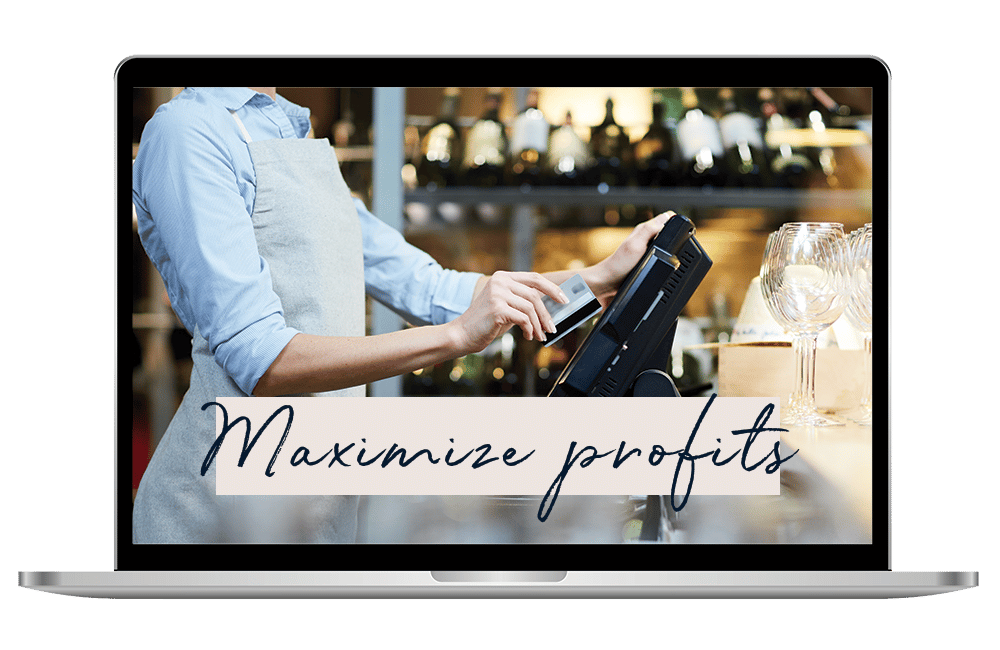
The three costly mistakes you could unknowingly be making?
Find out in this FREE guide and restaurant assessment specifically designed to reveal the unexpected hurdles standing between you and exponential business growth.
Thank You To Our Sponsors
For a limited time only, popmenu is offering our listeners $100 off your first month plus an unchanging lifetime rate.
Request a DEMO:
The key to restaurant communications is cutting edge tech for your customers and team. For more than 35 years, JTECH has been at the forefront of Restaurant Communications.
Restaurant Rockstars listeners get 10% off with our link!
Your operations base camp that scales standard procedures, trains your team, controls operations, and even manages food safety.
Get white glove service with FREE onboarding and implementation.
Want to become a podcast sponsor?
Please get in touch with Roger at roger@restaurantrockstars.com
